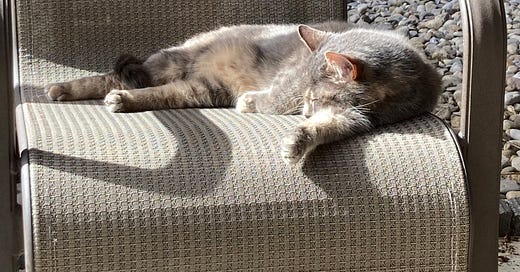Obviously, I wrote this earlier this week, on Tuesday, before February turned cold and became February again, at least for a day or so. Apologies to all the folks in the rest of the country who are buried under many feet of snow, including, I guess, Southern California? The world is weird.
It’s a little hard to wrap my brain around the idea that this week I sat outside in the sun, without a coat, in February. “Who is this month?” I find myself asking. “Where did they come from? What did they do with the real February?”
Obviously the answer (it’s climate change, dummy) is so much less pleasant than the sensation of sunlight on my face. So much less pleasant than the shadow of my pen meeting the page as I write this, lounging in the party pavilion, one of the cats laid out in the chair beside me, her orange nose twitching at the warm air.
So let’s not worry about why this February is so unrecognizable, but focus instead on the simple pleasure of sunshine.
It’s hard, though, isn’t it? Or is that just me? The cat beside me has already drifted off to sleep, one ear turned toward the noise from the street or a bird flying overhead.
It’s a breezy day, too, so even without the leaves yet on the trees, I can hear the wind, moving through the big pine across the street. I can see the branches rippling and shivering against the blue sky. There isn’t a more peaceful sound, is there?1 I feel that sound, the shush-shushing, somewhere behind my heart or my lungs.2 An echo of my own breathing.
“This is perfect,” I think.
Then the terror.
Or maybe terror isn’t the right word for what I feel. Maybe it’s excitement, the close cousin to anxiety and fear. As far as my body’s concerned, after all, those emotions are all the same. A quickening of pulse and breath.
Or maybe it’s not terror or excitement that I’m feeling, but joy. I’ve been reading a lot about joy lately. Ross Gay’s new book, Inciting Joy. Susan Cain’s book, Bittersweet, which is about sadness and joy, the two so much more closely connected than we generally believe. And Brené Brown’s Atlas of the Heart, correctly notes that joy is the hardest emotion to feel. To sit with. Joy scares us. Why?
There is, for so many of us, the sense that we are not worthy of joy. We have not earned joy. I think this is where foreboding joy comes from—the sense that our joy cannot last (which is true) and that allowing ourselves to feel it will surely bring disaster (which is not true).
Do we deserve joy? I heard Richard Rohr say that true gratitude as a practice is understanding that everything is undeserved. To wake up in the morning—undeserved. To have love—undeserved. To sit in the sun listening to the breeze—also undeserved.
But pain? That’s also undeserved. And sickness and heartbreak and fear. We deserve none of it, really, which ends up being the same as deserving all of it. You don’t earn your joy anymore than you earn your sorrow. They just are.
But even if we can get to a place where we believe we’re worthy of joy, there’s still a too-much-ness to the emotion. Joy is exquisite. It’s sharp. Joy is like the fizz in the perfect Coke—it tastes so good, but it also hurts a little, and the two are inseparable.
I think this is also part of the terror of joy—the reason we turn away from it. It feels as if joy will consume us. As if we will be burnt away in its fire. We touch joy and then jerk our hands away.
I don’t know how to get better at feeling joy. I don’t even know if it’s possible. Can it become, like gratitude, a practice? I certainly suspect that a gratitude practice creates a fertile field for joy. And perhaps the more joy we feel, the better we get at settling down into that moment, instead of turning away? I’m not sure, but it seems worth a try.
In fact, there’s scientific evidence now (if you’re into that sort of thing) that sounds like that—a babbling brook, the wind in the trees—does, in fact, chill us out. When we listen to nature sounds, the outward-directed areas of our brain fire up. Artificial sounds, on the other hand, activate the inward-directed parts of our brain, those associated with trauma, anxiety and depression. Nature sounds also increase activity in our rest-digest functions, associated with relaxation. So if you needed scientific evidence that the wind blowing in the trees chills you out, there you have it.
This also makes sense that I would feel the sound of trees in my heart and lungs, as the vagus nerve is a big part of those effects on our body—some people are calling the vagus nerve ‘the soul organ’—and the vagus nerve runs behind our throats, curling around our hearts. Sort of along the line of the chakras, if you’re into that sort of thing.





Your writing gives me joy.
I think it is a practice, to allow yourself to savor in the moment, especially when you notice yourself pull away. To do something like saying "it's ok for me to feel this now".